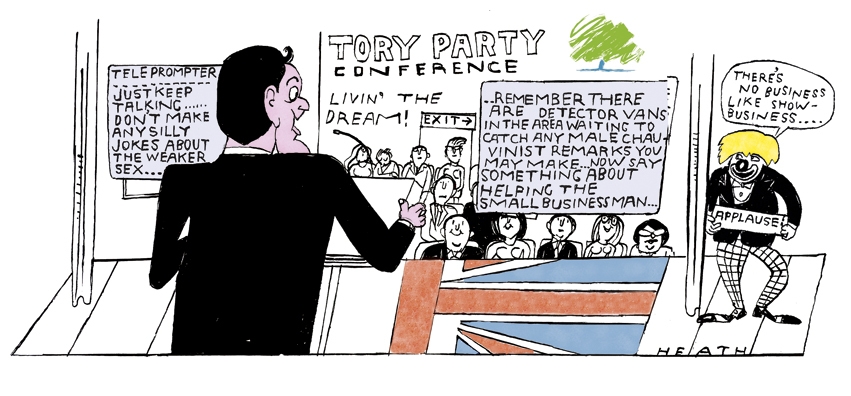Home
George Osborne, the Chancellor of the Exchequer, told the Conservative party conference in Manchester that the Treasury would spend billions buying bonds from small and medium-sized businesses in an exercise called ‘credit easing’. He announced a freeze on council tax for a second year, saving householders an average of £72. He also remarked: ‘We’re not going to save the planet by putting our country out of business.’ David Cameron, the Prime Minister, told the nation to pay off its credit card bills. He also said: ‘As eurozone countries move to co-ordinate more, as I believe they should, those outside the eurozone will need certain safeguards’; Treasury officials were studying ways to protect British interests in trade and financial services. The UK economy grew by only 0.1 per cent between March and June, according to the Office for National Statistics, not the 0.2 per cent originally estimated. The FTSE 100 share index fell below 5000. Tesco sales for the year fell a little and Sainsbury’s rose a little. The temperature at Gravesend, Kent, reached 85.8˚F, the hottest October day ever recorded.
•••
Theresa May, the Home Secretary, said that an illegal immigrant had avoided deportation because he had a pet cat in Britain; Kenneth Clarke, the Justice Secretary, said he could not believe that. Damien Fowkes, serving a life sentence for armed robbery, pleaded guilty to the manslaughter of Colin Hatch, a child-murderer, in Frankland prison, and the attempted murder of Ian Huntley, the Soham murderer, in Full Sutton prison. The landlady of the Red, White and Blue pub in Portsmouth was found by the European Court of Justice not to have unlawfully used a Greek-made decoder to show television coverage of Premier League matches. Builders began to fit 4,400 solar panels on to the roof of the new Blackfriars station, on the bridge over the Thames. A five-storey mill in the centre of Bradford burnt down.
•••
The Welsh government had its own little budget, with the housing, regeneration and heritage department taking a cut of 4.9 per cent next year. The Booksellers Association said that a quarter of independent bookshops had closed in the past five years, reducing the number to 1,099. A hybrid of British and wild Sicilian broccoli went on sale at Marks and Spencer. The Tynemouth lifeboat and an RAF rescue helicopter were called out when a member of the public mistook the planet Jupiter for a distress flare.
Abroad
The euro currency crisis deepened. Greece announced that its deficit for 2011 was expected to be 8.5 per cent of GDP, more than the 7.6 per cent target stipulated by the EU and IMF. Eurozone finance ministers cancelled a meeting set for 13 October, which had been expected to finalise loans to Greece to prevent it defaulting. Evangelos Venizelos, the Greek finance minister, said it would be all right if Greece received eight billion euros by November. Greeks went on a one-day general strike. Shares fell in Dexia, the Franco-Belgian bank regarded as vulnerable to Greek loans. Moody’s degraded Italy’s debt to A2. The European Space Agency resolved to spend a billion euros sending a space probe to within 26 million miles of the Sun.
•••
A United States drone in northern Yemen killed Anwar al-Awlaki, a leading figure in al-Qa’eda. A suicide bomb at a Somali government compound in Mogadishu killed at least 70. A disabled French woman was abducted by an armed gang on the resort island of Manda in Kenya and taken to Somalia. Two Somali men were sentenced in Norfolk, Virginia, to life in prison for their part in the capture of a yacht in the Gulf of Aden in February, when four Americans were killed. Forces of the Libyan transitional government renewed their assault on Sirte, the birthplace of the deposed ruler Colonel Gaddafi. A few people were injured in clashes with security forces in eastern Saudi Arabia, where the minority Shia population lives. China and Russia vetoed a UN Security Council resolution condemning Syria for its treatment of anti-government protesters.
•••
Amanda Knox, an American, and Raffaele Sollecito, an Italian, were both found not guilty on appeal of the murder of Meredith Kercher, an English woman, in Perugia in 2007. Knox’s conviction for slander was upheld, in accusing a bar-owner of carrying out the killing. The Dalai Lama cancelled a visit to South Africa for the 80th birthday of Archbishop Desmond Tutu because the government would not grant him a visa. The Nobel assembly made Professor Ralph Steinman of New York a co-recipient of the prize for medicine, not knowing he had died the week before. CSH






Comments